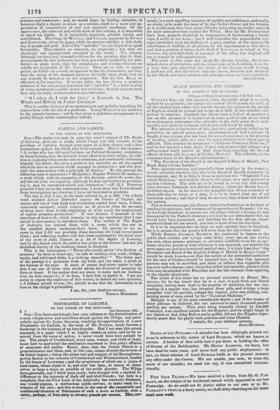CAPITAL AND LABOUR.
TO TLIE EDITOR OF THE SPECTATOR.
SIR—The notice you took in your last week's journal of The Rights of Industry, gives me a claim, which I hope you will concede, to the
privilege of replying, through your pages, to a false charge and a base insinuation against me which that book contains. This is the charge- " A writer who has delivered lectures on Political Economy, complains, in those lectures, that the labourer is not allowed to work unless, in addi- tion to replacing whatever he uses or consumes, and comfortably subsisting himself, his labour also gives a profit to the capitalist on all the capital which he uses or consumes while engaged in production ; and this prin- ciple the same author calls a principle of slavery." To this passage the following note is appended—" Hodgskin's Popular Political Economy,— a work which, with the exception of this doctrine, which the writer him- self shrinks from investigating, although he does not hesitate in proclaim- ing it, may be considered useful and instructive."—(P. 57.) However grateful I may be for the commendation, I must deny that I ever shrunk from investigating any doctrine I have not hesitated to proclaim. The fact is, that I say, in the book referred to, at p. 238, "In a little
work entitled Labour Defended against the Claims of Capital, the nature and use of both fixed and circulating capital have been, I think, accurately analysed; which relieves me at present from the necessity of doing snore than briefly explaining in what sense the employment of capital promotes production." It was because I assented to the doctrines of that work, which remains to this day unrefined, that I con- ceived it unnecessary to reproduce them. The author of The Rights of Industry has noticed them with a sneer, which has not in the smallest degree weakened their force. My answer to any ac- cuser is, that I did not proclaim these doctrines till I had investigated them ; and reflecting readers will find them confirmed by the latter part of the story of John Tanner, at p. 44 of The Rights of hulustry, and by the sketch which the author has given of the former and not yet abolished slavery of the working classes in England.
This is the insinuation—" Those who would advise the division of
property' by force or fraud say, to talk of sending away roads, bridges, canals, and cultivated fields, is a striking absurdity.' " The latter part of the passage is a quotation from my book, and my name is given at the bottom of the page. It must of course lead every reader to infer that I am one of those who would advise the division of property by force or fraud. If the author does not mean to make such an insinua- tion, let him retract it ; if he does, I dare him to justify it. I am not going to expose the sophistry of this writer, or defend my own opinions, —I address myself to you, Sir, merely to say that the insinuation is as base as the charge is groundless.
I am, Sir, your obedient servant,
THOMAS HODOSION.


























 Previous page
Previous page